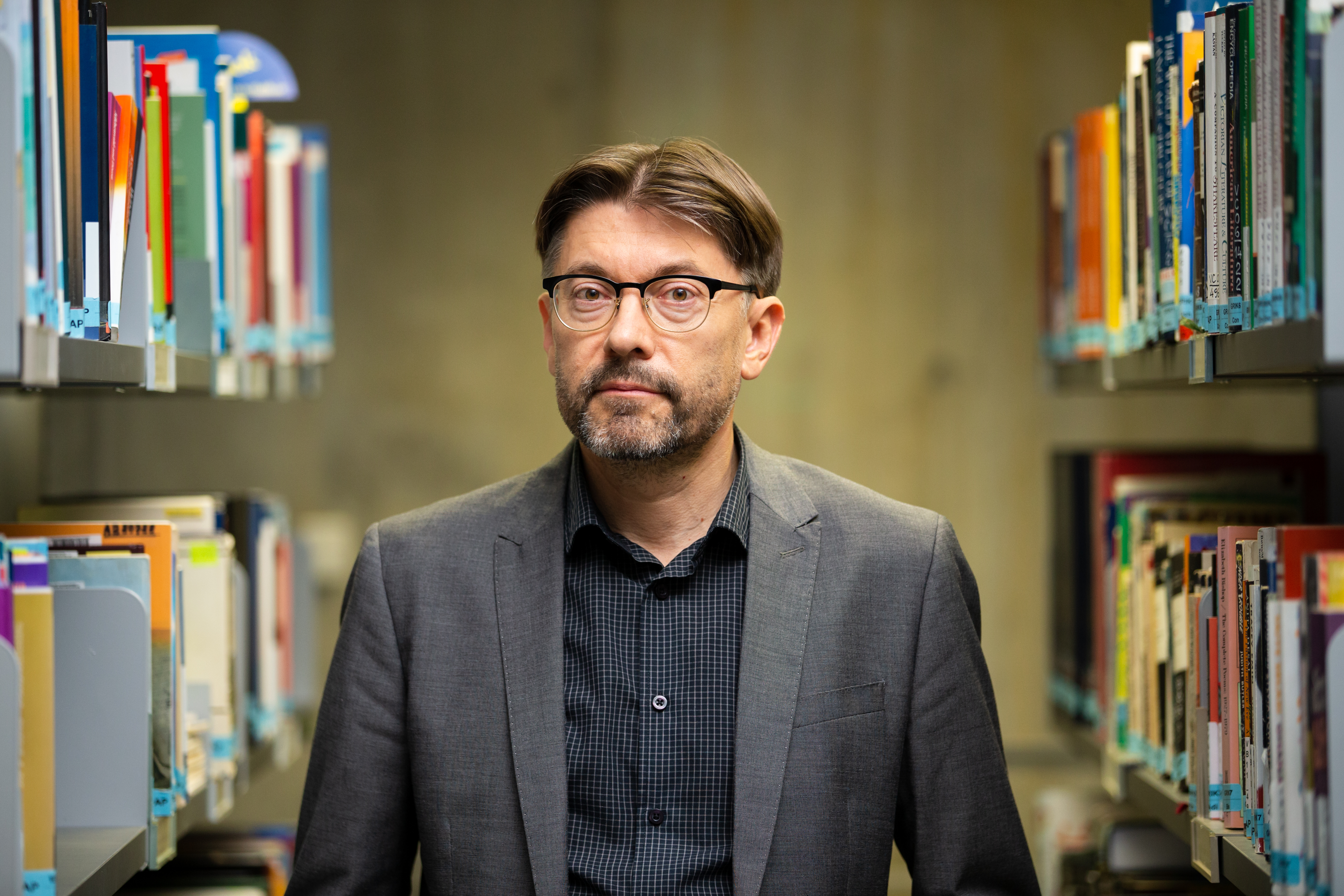Rector
The Rector is the legal representative of the university, responsible for managing the university's daily activities based on the university's development plan, budget, and other strategic documents. The Rector is accountable to the council and the senate. The Rector is elected by an electoral body composed of all members of the council and the senate, the university's professors, and student representatives elected by the student union's council.
The Rector of Tallinn University for the term 2021–2026 is Professor of Philosophy Tõnu Viik.

Curriculum vitae
Born on July 12, 1968, in Jõhvi.
Education
| 1998–2003 | Emory University, Atlanta (Doctoral studies) PhD (2003) |
| 2001–2002 | Humboldt University of Berlin (Emory Fellow) |
| 2000–2001 | Philipps University of Marburg (Emory Fellow) |
| 1997–1998 | University of Helsinki (SIMO Fellow) |
| 1986–1993 | Moscow State University (5-year diploma program) Diploma (1993) |
| 1978–1986 | Nõmme Gymnasium |
| 1975–1978 | Jõhvi Gymnasium |
Career
| 2021–… | Rector of Tallinn University |
| 2020–… | Professor of Philosophy at Tallinn University |
| 2015–2020 | Director of the Institute of Humanities at Tallinn University |
| 2014–2015 | Director of the Estonian Institute of Humanities at Tallinn University |
| 2007–2015 | Professor of Philosophy at the Estonian Institute of Humanities, Tallinn University |
| 2004–2007 | Rector of the Estonian Institute of Humanities |
| 2003–2004 | Professor of Philosophy at the Estonian Institute of Humanities |
| 2002–2003 | Lecturer at Emory University (Atlanta) |
| 1999–2000 | Teaching Assistant at Emory University (Atlanta) |
| 1994–1998 | Lecturer at the Estonian Institute of Humanities |
| 1993–1994 | Lecturer at Tallinn University of Technology |
Research and Teaching Focus
My academic work has primarily focused on the following areas: philosophy of culture and cultural theory, phenomenology, history of philosophy (particularly Plato, Aristotle, Thomas Aquinas, Kant, Hegel, Husserl, Heidegger, Foucault), culture-dependent meaning-making, collective emotions, happiness, love, and self-deception. A list of scientific articles, supervised theses, taught courses, and other relevant information can be found on ETIS.
Public Engagement and Social Activity
I have published opinion articles, essays, book reviews, forewords and afterwords, textbooks, and teaching materials on my research topics. I have also participated in public debates and discussions and was involved in the establishment of Tallinn University in 2005. I was one of the signatories of the "Harta 12" and a participant in the "Jääkelder" process, and one of the authors of the "Living Worthy State" initiative. I am a member of the Open Estonia Book Council at the Cultural Endowment of Estonia, participated as an expert in the development of Estonia's Education Strategy 2021–2035, and was one of the authors of the Estonian Human Development Report 2016/17.
Rector Tõnu Viik has outlined his three main goals for leading the university as follows:
Leading a Smart Life
For the Estonian state and society, it is more important than ever for academic thinking, evidence-based decision-making, and smart solutions to enter the public sphere. In a world intertwined technologically, economically, culturally, and politically, the well-being of a nation increasingly depends on its ability to implement science-based and innovative decisions. Tallinn University must be a visible and valued contributor to making Estonian life more evidence-based in all its research areas, especially in matters concerning educational innovation, social cohesion and multilingualism, the promotion of the Estonian language and culture, and fostering green thinking and sustainable lifestyles. To achieve these goals, we need to learn how to better connect our core activities (i.e., teaching and research) with society. We must not only participate in the digital transformation but make it work effectively for us and become the leader of educational digital transformation in Estonia.
Education that Meets 21st Century Expectations
The university's obligation to its students means transforming them into bearers of academic culture and intellectual thought. The learning process must be inspiring, motivating, and, of course, demanding for both the student and the lecturer. Studying at the university should not only provide professional knowledge but also be a life-changing experience that shapes the student's personality. Teaching should increasingly become a way for lecturers to advance their research, reinforce the findings, and give them deeper meaning. In adapting the learning process to meet societal expectations, we must consider what flexible and individualized learning paths mean in the context of Tallinn University and how to develop 21st century skills that include both professional knowledge as well as social and emotional competencies. We need to find effective ways to work with students who are employed while studying or who need support with self-management and time management skills.
A Smart Organization that Empowers its Members
As an organizational structure, the university is primarily a community of scholars dedicated to the pursuit of scientific truth and wisdom, tasked with preserving and passing on academic culture and values to students and society. The task of the rector’s leadership team is to ensure that the university, as an institution and organization, best facilitates and supports this mission. To achieve this, we must diversify and strengthen the university's financial base and move increasingly from accountability-based management to data-driven management. The university’s leadership must be open, purposeful, empowering for all members, and inclusive of different stakeholders. We must develop the university into an innovative, adaptable, and sustainable organization. Tallinn University must be a place where people are eager to study and work.
For more details on the goals of Tallinn University and their implementation, please refer to the university's development plan.